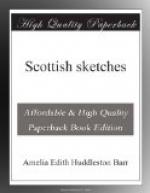“It was better,” he said, “that the old feudal tie should be severed even by a thousand leagues of ocean. They were men and not bairns, and they could feel their ain feet;” and then he smiled as he remembered how naturally they had taken to self-dependence. For one night, in a conversation with the oldest men, he said, “Crawfords, ye’ll hae to consider, as soon as you are gathered together in your new hame, the matter o’ a dominie. Your little flock in the wilderness will need a shepherd, and the proper authorities maun be notified.”
Then an old gray-headed man had answered firmly, “Dominie, we will elect our ain minister. We hae been heart and soul, every man o’ us, with the Relief Kirk; but it is ill living in Rome and striving wi’ the pope, and sae for the chief’s sake and your sake we hae withheld our testimony. But we ken weel that even in Scotland the Kirk willna hirple along much farther wi’ the State on her back, and in the wilderness, please God, we’ll plant only a Free Kirk.”
The dominie heard the resolve in silence, but to himself he said softly, “They’ll do! They’ll do! They’ll be a bit upsetting at first, maybe, but they are queer folk that have nae failings.”
A long parting is a great strain; it was a great relief when the ships had sailed quite out of sight. The laird with a light heart now turned to his new plans. No reproachful eyes and unhappy faces were there to damp his ardor. Everything promised well. The coal seam proved to be far richer than had been anticipated, and those expert in such matters said there were undoubted indications of the near presence of iron ore. Great furnaces began to loom up in Crawford’s mental vision, and to cast splendid lustres across his future fortunes.
In a month after the departure of the clan, the little clachan of Traquare had greatly changed. Long rows of brick cottages, ugly and monotonous beyond description, had taken the place of the more picturesque sheilings. Men who seemed to measure everything in life with a two-foot rule were making roads and building jetties for coal-smacks to lie at. There was constant influx of strange men and women—men of stunted growth and white faces, and who had an insolent, swaggering air, intolerably vulgar when contrasted with the Doric simplicity and quiet gigantic manhood of the mountain shepherds.
The new workers were, however, mainly Lowland Scotchmen from the mining districts of Ayrshire. The dominie had set himself positively against the introduction of a popish element and an alien people; and in this position he had been warmly upheld by Farquharson and the neighboring proprietors. As it was, there was an antagonism likely to give him full employment. The Gael of the mountains regarded these Lowland “working bodies” with something of that disdain which a rich and cultivated man feels for kin, not only poor, but of contemptible nature and associations. The Gael was poor truly, but he held himself as of gentle birth. He had lived by his sword, or by the care of cattle, hunting, and fishing. Spades, hammers, and looms belonged to people of another kind.




